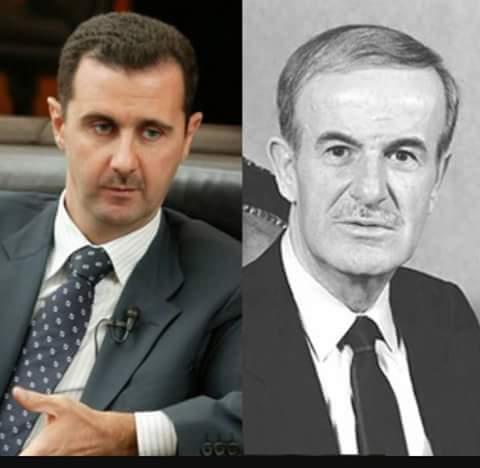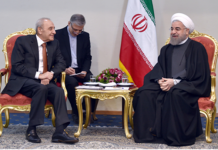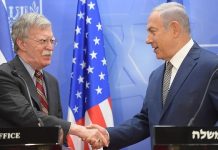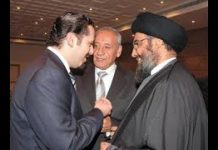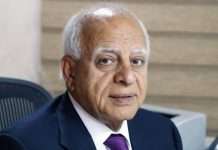Why Assad Has Become Irrelevant
Amir Taheri/Asharq Al Awsat/August 26/16
Hearing diplomats and policymakers talking about Syria, one is bound to quickly come across a cliché: There is no military solution! But what if the opposite were true in the sense that the five-year plus “problem” couldn’t be solved except through military action? It is interesting that all those who talk of “no military solution” are doing nothing but taking military action in Syria which, in practice, means dropping bombs from the air and killing vast numbers of Syrians. Just days after US Secretary of State John Kerry came out with the “no military solution” cliché, the Pentagon unveiled a new plan for intensified bombings in Syria. Kerry’s Iranian “buddy” Muhammad Javad Zarif, playing the role of Foreign Minister, repeated the mantra while touring Cuba just a day before his masters in Tehran granted “base facilities” to Russia from which to intensify bombing Syria and kill even more Syrians.
Zarif’s Turkish counterpart, Mevlut (Moloud) Cavusoglu peddled the slogan hours before Ankara announced a new plan for “massive military operations across the border with Syria.” A day later, Turkish tanks rolled into Syria. Joining the chorus, Russian President Vladimir Putin echoed the “no military solution” slogan just as his heavy bombers were killing Syrians on an even larger scale. Theoretically at least, there can be a military solution to almost any problem in the context of national or international conflicts. Just imagine if we had a power or group of powers capable of committing enough troops and firepower to dislodge Bashar Al-Assad, the Islamic Caliphate, the various freelance groups, and tribal chiefs, each controlling a chunk of Syria.
Such a scheme may take time, but it certainly is doable, especially when one remembers that without foreign money and arms, Assad and other characters who have divided Syria cannot last for long. The honest analysis is that while there is a military solution no one is willing to contemplate it on the scale necessary. So the kiling continues. Why has military action so far failed to end the Syrian crisis?The reason is that powers involved in this imbroglio could be divided into three categories. First there are the midgets like the Islamic Republic in Iran and Erdogan’s Turkey that suffer from folie de grandeur, having high ambitions but not the means to achieve them.
Next there are me-tooist nations, medium-sized powers such as Britain and France that wish to play in the big league but lack the wherewithal. They opt for token bombings that certainly kill many Syrians but achieve little in military terms. (The UK has carried out 52 sorties in more than six months!) Finally, we have the United States and Russia which do have the military power, including potential allies, to wield the really big hammer needed. However, they too have opted for tokenism for different reasons. The US has been chained by President Barack Obama’s deep-rooted anti-American analysis of contemporary history in which a nation he now heads is cast in the role of villain and bully. (Obama says he is pained by the US forcing the Emperor of Japan to come to the radio in Tokyo and personally declare his country’s surrender to the US at the end of the Second World War.)
That Obama’s ideological penchant may be the product of noble intentions is not the issue here. What is at issue is the fact that he has prevented the US from performing a role it has held since the Second World War as custodian of stability in various regions, including the Middle East of which Syria is a significant part. Russia, too, has the firepower and troop numbers to re-write the Syrian script by force, especially now that the US is determined to remain on the ringside. However, Putin is an opportunist determined to win a maximum of advantages with a minimum of investment. He knows that because of deepening economic crisis and rising social discontent, his regime is heading for a bumpy ride which would make massive military intervention in Syria that much riskier. For the time being, therefore, he is trying to grab what he can: base rights in Iran, expanded bases in Syria, casting himself as a true friend of Arabs defending his friends while Americans stab their friends in the back, and the champion of the global war on terror.
With military action off the table, everyone is focused on a simulacrum of diplomacy centered on two issues: episodic ceasefires and the future of Assad Junior. As far as the broader compass of the Syrian tragedy is concerned, both issues have become largely irrelevant. Patchy ceasefires are no more than brief intervals in a struggle to the death, only prolonging it. Assad’s future is also a non-issue because he has no future. No one would imagine Assad to regain a position he lost in 2011 or even be able to emerge from his foxhole for a meaningful sortie in Syria. Assad has already entered history as the only head of state that invited foreign powers to come and kill his fellow citizens from the air. He has betrayed the first and most important duty of any head of state: to protect the lives of his people.
Almost 80 years ago General Fransisco Franco invited Nazi Germany and Fascist Italy to come and kill Spaniards by aerial bombardment. They did, and one result was the massacre of Guernica which was to become the epitome of infamy in modern history. Assad is worse than Franco if only because, at the time he invited the Fascists, the general was not head of state but a rebel fighting against the government. Even then, the German-Italian bombing of Guernica claimed under 300 lives, a “trifle” compared to victims of Russian bombings in Aleppo in a single weekend. Franco won the civil war but never recovered from the tragic error of inviting foreigners to come and kill his people. Assad has no qualms about spreading the red carpet for “protectors” of non-existent shrines from Iran, not to mention mercenaries from Lebanon, Iraq, Pakistan, and Afghanistan coming for killing sprees in Syria.
The Syrian crisis started as a popular uprising demanding reforms. It morphed into a national revolt against the one-party system led by Assad. Because of errors by all sides it degenerated into a mixture of civil war, sectarian conflict and terrorist atrocities. It has now become a human tragedy on a scale not seen since the Second World War.To end it we have to first scale it back to its origins. But that is another story.
سوريا.. لماذا صار الأسد عديم الصلة؟
أمير طاهري/الشرق الأوسط/26 آب/16
إن سماع الدبلوماسيين والساسة وهم يتحدثون في شأن سوريا٬ يميل لأن يفضي سريًعا إلى عبارة مبتذلة: ليس هنالك حل عسكري! لكن ماذا لو كان العكس صحيًحا٬ بمعنى أن «مشكل» ما يزيد على الخمس سنوات٬ لا يمكن حله إلا من خلال عمل عسكري؟ من المثير للاهتمام أن كل أولئك الذين يتحدثون عن أن «لا حل عسكريا…» لا يفعلون إلا القيام بعمل عسكري في سوريا٬ وهو ما يعني عملًيا إلقاء القنابل من الجو وقتل أعداد كبيرة من المدنيين. بعد بضعة أيام على خروج وزير الخارجية الأميركي جون كيري علينا بعبارة «لا حل عسكريا…»٬ خرجت علينا وزارة الدفاع الأميركية «البنتاغون» بخطة جديدة لتصعيد عمليات القصف الجوي في سوريا. كرر «صديق» كيري الإيراني المقرب٬ محمد جواد ظريف٬ مؤدًيا دور وزير الخارجية٬ هذه اللازمة٬ فيما كان في جولة إلى كوبا قبل أيام قليلة على منح رؤسائه في طهران تسهيلات في استخدام القواعد العسكرية» لروسيا٬ لتصعد من خلالها عملياتها لضرب سوريا.
وكان نظير ظريف التركي٬ مولود جاويش أوغلو٬ قد كرر هذه العبارة قبل ساعات على إعلان أنقرة عن خطة جديدة لـ«عمليات عسكرية كبرى على الحدود مع سوريا».
انضم الرئيس الروسي فلاديمير بوتين إلى هذه الجوقة٬ وكرر الشعار القائل بأن لا حل عسكرًيا لسوريا٬ في تمام الوقت الذي كانت فيه قاذفاته الاستراتيجية تقتل السوريين على نطاق أوسع. من الناحية النظرية على الأقل يمكن أن يكون هناك حل عسكري لكل مشكلة تقريًبا في سياق النزاعات الوطنية أو الدولية.
وما عليك إلا أن تتخيل لو كانت لدينا قوة أو مجموعة قوى قادرة على استخدام ما يكفي من القوات وقوة النيران للإطاحة ببشار الأسد٬ و«داعش»٬ وكثير من الجماعات٬ وزعماء العشائر٬ الذين يسيطر كل منهم على جزء من سوريا. ربما تستغرق الخطة بعض الوقت٬ ولكنها في الإمكان من دون شك٬ وبخاصة عندما يتذكر المرء أنه من دون الأموال والعتاد من الخارج٬ لا يمكن للشخصيات التي تحكم سوريا أن تستمر طويلا. إذن٬ لماذا أخفق العمل العسكري حتى الآن في وضع نهاية للأزمة السورية؟ السبب هو أن القوى الضالعة في هذا الوضع المعقد يمكن تقسيمها لـ3 فئات.
أولاً٬ هناك إيران وتركيا الإردوغانية التي تعاني جنون العظمة٬ اللتين لديهما سقف طموحات مرتفع لكنهما لا تملكان الوسائل لتحقيقها. ثانًيا٬ هناك الدول الباحثة عن دور٬ وهي قوى متوسطة الحجم مثل بريطانيا وفرنسا٬ اللتين ترغبان في اللعب في الدوري الكبير٬ لكنهما تفتقران إلى الوسائل المطلوبة. ويلجأ هذان البلدان إلى تنفيذ غارات رمزية تقتل السوريين ما من شك في هذا٬ ولكنها لا تحقق أي شيء بالمعنى العسكري. (نفذت المملكة المتحدة 52 طلعة جوية خلال ما يزيد على 6 أشهر!).
وأخيرا٬ لدينا الولايات المتحدة وروسيا اللتان تملكان القوة العسكرية٬ بما في ذلك الحلفاء المحتملون٬ للعب الدور المؤثر المطلوب. ومع هذا٬ فحتى هذان البلدان ارتكنا إلى الرمزية لأسباب مختلفة: باتت الولايات المتحدة مقيدة بتحليل الرئيس باراك أوباما المتأصل للعداء لأميركا في التاريخ المعاصر٬ والذي بموجبه يؤدي البلد الذي يقوده الآن دور المتنمر. (يقول أوباما إنه يتألم لكون الولايات المتحدة أرغمت إمبراطور اليابان على أن يتوجه لإذاعة طوكيو٬ ويعلن شخصَيا استسلام بلاده للولايات المتحدة). ليس موضوعنا هنا ما إذا كانت هذه النزعة الآيديولوجية عند أوباما نتاًجا لنوايا نبيلة من عدمه؛ إنما المسألة هي حقيقة أنه منع الولايات المتحدة من لعب دور اضطلعت به منذ الحرب العالمية الثانية٬ كراعية للاستقرار في مناطق عدة من العالم٬ بما في ذلك الشرق الأوسط الذي تمثل سوريا جزًءا مهًما فيه. كذلك الأمر بالنسبة لروسيا٬ التي تملك قوة النيران والقوات لكتابة سيناريو الوضع السوري بالقوة٬ وبخاصة الآن٬ حيث تصمم الولايات المتحدة على الاكتفاء بدور المتفرج. ومع هذا٬ فبوتين شخصية براغماتية٬ وهو عازم على الفوز بأقصى الميزات بأقل مجهود.
هو يعرف أن نظامه يتجه بسبب الأزمة الاقتصادية الشديدة والغضب الاجتماعي المتصاعد٬ إلى طريق وعر يمكن أن يجعل التدخل العسكري على نطاق واسع في سوريا أكثر خطورة. ومن ثم٬ فهو في الوقت الراهن يحاول أن يتشبث بما في الإمكان: حقوق في استخدام القواعد في إيران٬ وتوسيع قواعده في سوريا٬ وتقديم نفسه كصديق حقيقي يدافع عن أصدقائه٬ فيما الأميركيون يطعنون أصدقاءهم في الظهر٬ وبطلاً للحرب العالمية على الإرهاب. ومن ثم٬ ففي غياب العمل العسكري عن الطاولة٬ يركز الجميع على دور دبلوماسي غير حقيقي يقوم على مسألتين: اتفاقات جزئية لوقف إطلاق النار٬ ومستقبل الأسد الابن.
أما من جهة المأساة السورية الأوسع نطاًقا٬ فكلتا المسألتين عديمتا الصلة إلى حد بعيد. لم تعد اتفاقات وقف إطلاق النار غير المستقرة سوى فواصل قصيرة في صراع حتى الموت٬ ومن ثم فهي تطيل من أمده.
ومستقبل الأسد ليس مسألة مهمة؛ لأنه ليس لديه مستقبل. لا أحد يتخيل أن يستعيد الأسد مركًزا فقده في ٬2011 أو حتى أن يكون قادًرا على الخروج من خندقه ليقوم بهجوم مباغت ومؤثر في سوريا. لقد دخل الأسد التاريخ بالفعل٬ بوصفه رئيس الدولة الوحيد الذي استدعى القوى الأجنبية لأن تجيء وتأتي بني وطنه بالموت من الجو. ومن ثم فقد خان الرجل أول وأهم واجب لرئيس دولة: أن يحمي أرواح شعبه. قبل ما يقرب من 80 عاًما استدعى الجنرال فرانسيسكو فرانكو ألمانيا النازية وإيطاليا الفاشية لأن تجيئا وتقتلا الإسبان بطريق القصف الجوي. وقد فعلتا٬ وكانت من نتائج ذلك مجزرة غيرنيكا٬ التي صارت تجسيًدا للعار في التاريخ الحديث. أما الأسد فقد جاء بما هو أسوأ حتى مما فعله فرانكو٬ إذا عرفنا أن الجنرال عندما استدعى الفاشيين٬ لم يكن رئيس دولة٬ وإنما كان متمرًدا يقاتل ضد الحكومة. ومع هذا٬ فقد قتل القصف الألماني الإيطالي لغيرنيكا عدًدا أقل من 300 شخص٬ وهو عدد «تافه» مقارنة بضحايا القصف الروسي في حلب في أسبوع واحد. كسب فرانكو الحرب الأهلية؛ لكنه لم يتعاَف أبًدا من الخطأ المأساوي باستدعاء الأجانب للمجيء وقتل شعبه. لا يتورع الأسد عن مد السجادة الحمراء لـ«حماة» الأضرحة غير الموجودة٬ القادمين من إيران٬ ناهيك عن المرتزقة من لبنان والعراق وباكستان وأفغانستان٬ القادمين لإشاعة القتل في سوريا.
بدأت الحرب السورية كانتفاضة شعبية تطالب بالإصلاح. وتطورت إلى ثورة وطنية ضد نظام الحزب الأوحد الذي يقوده الأسد. وبسبب أخطاء كل الأطراف انزلقت لتصير إلى مزيج من الحرب الأهلية والنزاع الطائفي والفظائع الإرهابية. ولقد أصبحت الآن مأساة إنسانية على نطاق غير مسبوق منذ الحرب العالمية الثانية. ولوضع حد لهذه المأساة٬ علينا أولاً أن نردها إلى بداياتها. لكن هذه قصة أخرى.
















